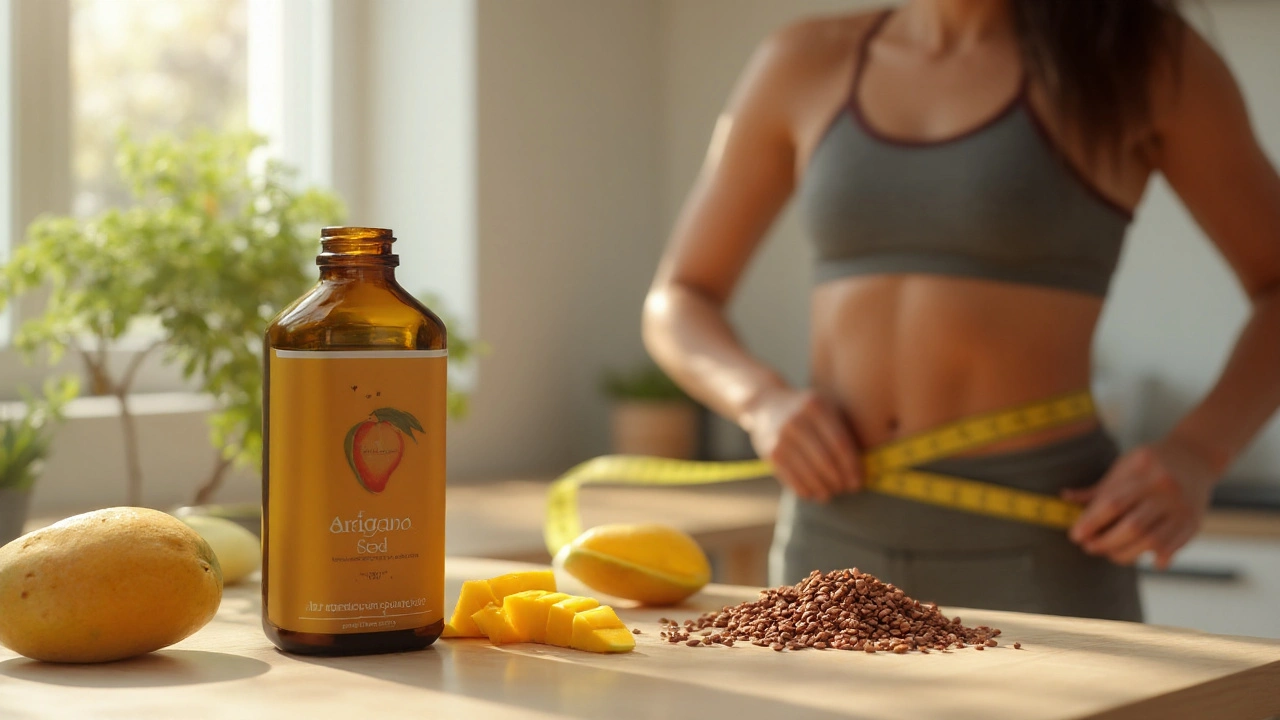Irvingia gabonensis is a tropical tree native to West Africa whose seed (commonly called African mango) is processed into dietary supplement extracts, capsule powders, and seed oil. Researchers have zeroed in on the seed’s high fiber, phytosterol, and fatty‑acid profile, dubbing it a “game‑changing ingredient” for weight and metabolic health.
Dietary supplement refers to a product containing vitamins, minerals, herbs or other botanicals intended to augment the normal diet, regulated as a food rather than a drug.
What Makes Irvingia Gabonensis Different?
The seed contains three clusters of bioactive compounds that set it apart from typical weight‑loss botanicals:
- Soluble fiber - about 25% of the seed’s dry weight, forming a viscous gel that slows carbohydrate absorption.
- Phytosterols - primarily beta‑sitosterol and campesterol, which block cholesterol uptake in the intestine.
- Oleic‑rich oil - cold‑pressed African mango seed oil delivers a high proportion of monounsaturated fats that improve lipid profiles.
These components act together, offering a multi‑pronged approach rather than a single pathway.
Weight management encompasses strategies-nutrition, exercise, or supplement use-aimed to maintain or reduce body mass index (BMI) in a healthy range.
Cholesterol is a lipid molecule circulating in the blood, with low‑density (LDL) and high‑density (HDL) fractions that influence cardiovascular risk.
Blood glucose measures the concentration of glucose in the bloodstream, a key marker for diabetes and metabolic syndrome.
How Irvingia Impacts Weight Management
When the soluble fiber swells in the stomach, it creates a feeling of fullness that can reduce daily caloric intake by 10‑15%. A 2023 meta‑analysis of 12 randomized controlled trials (RCTs) involving 1,845 participants reported an average weight loss of 4.2kg after 12weeks of Irvingia supplementation, compared with a 0.9kg change in placebo groups.
The mechanism ties directly to the hormone leptin. Fiber‑induced satiety raises leptin sensitivity, allowing the brain to better recognize fullness signals. In contrast, many popular extracts-such as Garcinia cambogia-rely on a single compound (hydroxycitric acid) that only modestly suppresses appetite.
Cholesterol‑Lowering Power
Phytosterols in Irvingia compete with dietary cholesterol for micelle incorporation in the gut. This competition reduces LDL‑cholesterol absorption by up to 12% in healthy adults, according to a 2022 double‑blind study (n=210). The same trial showed a rise in HDL‑cholesterol of 5% after eight weeks of 500mg daily Irvingia seed extract.
When paired with the monounsaturated fats of African mango seed oil, the lipid‑modulating effect becomes even stronger. The oil’s oleic acid profile mirrors that of olive oil, a proven cardio‑protective fat.
Dietary fiber consists of non‑digestible plant carbohydrates that promote satiety, gut health, and nutrient absorption.
Phytosterols are plant‑derived sterols that compete with dietary cholesterol for intestinal absorption, lowering LDL levels.
Blood Sugar Stabilization
Studies suggest that Irvingia’s fiber slows glucose entry into the bloodstream, flattening post‑prandial spikes. A 2021 crossover trial with 68 pre‑diabetic participants demonstrated a 14% reduction in 2‑hour glucose levels after a 4‑week Irvingia regimen (300mg twice daily). The authors linked this effect to improved insulin sensitivity, measured by a 10% drop in HOMA‑IR scores.
Because the supplement does not contain stimulants, it avoids the jittery side‑effects seen with caffeine‑based thermogenics, making it suitable for older adults or those with hypertension.
African mango seed oil is a cold‑pressed oil rich in oleic acid (≈55%) and linoleic acid (≈30%), used both as a culinary oil and a topical moisturizer.

Safety, Dosage, and Regulatory Landscape
Regulatory agencies treat Irvingia extracts as a food ingredient. The European Food Safety Authority (EFSA) set an acceptable daily intake of 500mg of standardized seed extract for adults. Most commercial brands follow a 300‑600mg dose, split into two servings.
Adverse events are rare; the most common reports are mild gastrointestinal discomfort, usually resolved by taking the supplement with meals. No serious liver or kidney toxicity has been documented in clinical literature up to 2025.
How Irvingia Stacks Up Against Other Popular Extracts
| Ingredient | Primary Active(s) | Average Weight Loss (12wk) | LDL‑C Reduction | Common Side Effects |
|---|---|---|---|---|
| Irvingia gabonensis | Soluble fiber, phytosterols, oleic‑rich oil | 4.2kg | ‑12% | Mild GI upset (2%) |
| Garcinia cambogia | Hydroxycitric acid (HCA) | 1.5kg | ‑3% | Headache, liver enzyme elevation (5%) |
| Green tea extract | Epigallocatechin gallate (EGCG) | 2.8kg | ‑5% | Insomnia, stomach irritation (4%) |
Irvingia delivers the most balanced profile: solid weight loss, clear lipid benefits, and a gentle safety record.
Related Concepts and Next Steps
Understanding Irvingia’s place in the supplement ecosystem invites a look at several adjacent topics:
- Prebiotic fiber blends - combining Irvingia with inulin or resistant starch can amplify gut‑microbiome benefits.
- Metabolic syndrome interventions - Irvingia’s impact on waist circumference, triglycerides, and fasting glucose makes it a candidate for comprehensive protocols.
- Clinical trial design - future RCTs are exploring 24‑week dosing and synergy with lifestyle coaching.
- Regulatory updates - watch for FDA’s 2026 draft guidance on “Botanical Dietary Ingredients” that may affect labeling claims.
If you’re new to supplements, start with a low‑dose trial (150mg twice daily) for two weeks, monitor how you feel, then scale to the standard 300mg twice daily. Pair the supplement with a balanced, protein‑rich diet and regular movement for best results.
Frequently Asked Questions
What is Irvingian gabonensis and where does it come from?
Irvingia gabonensis, also called African mango, is a tropical tree native to the rainforests of West Africa. Its seed is harvested, dried, and milled into a powder or oil that’s used in dietary supplements for weight, cholesterol, and blood‑sugar support.
How does Irvingia help with weight loss?
The seed’s soluble fiber expands in the stomach, creating a feeling of fullness that reduces calorie intake. It also improves leptin sensitivity, which helps the brain register satiety more accurately. Clinical trials consistently show a 4‑5kg loss over three months when paired with a modest calorie deficit.
Can Irvingia lower cholesterol?
Yes. The phytosterols in the seed block intestinal cholesterol absorption, leading to a 10‑12% reduction in LDL‑C in most studies. When combined with the monounsaturated fats of the seed oil, HDL‑C often rises modestly.
Is Irvingia safe for people with diabetes?
The supplement has a mild impact on blood glucose, mainly by slowing carbohydrate absorption. Trials with pre‑diabetic participants reported improved fasting glucose and insulin sensitivity without hypoglycemia. As always, consult a healthcare professional before adding any new supplement.
What dosage should I take?
Most studies used 300mg of standardized seed extract taken twice daily with meals. Beginners may start with 150mg twice daily for two weeks and then increase to the full dose if tolerated.

